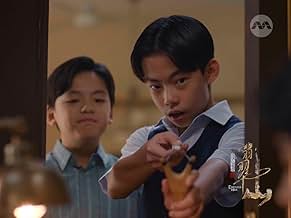Füge eine Handlung in deiner Sprache hinzuWhen a woman learns she is the long-lost daughter of the wealthy Zhang family, her life goes from improvised to full of upper-class drama.When a woman learns she is the long-lost daughter of the wealthy Zhang family, her life goes from improvised to full of upper-class drama.When a woman learns she is the long-lost daughter of the wealthy Zhang family, her life goes from improvised to full of upper-class drama.
Folgen durchsuchen
Empfohlene Bewertungen
I recently watched Emerald Hill - The Little Nyonya Story, and while the drama itself was fantastic, I couldn't help but feel that the endings were far too rushed. The storyline built up nicely, but everything seemed to come to an abrupt conclusion. It felt like there was so much more that could have been explored, and with only 30 episodes, it didn't do justice to the depth of the plot. I believe it deserved at least 40 episodes to really flesh out the characters and their arcs. The rushed ending left me with a sense of incompleteness, as if they had to wrap things up too quickly-perhaps due to budget constraints? Overall, a great drama, but the ending definitely felt slapdash.
I watched Emerald Hill during my june holidays. While I was watching Emerald Hill, I found it very addictive. The storyline was so interesting and full of action, I just could not stop watching. Everyday I would wake up looking forward to the next episode. After watching Emerald Hill I also found out that the first "the little nyonya" was launched in 2008. After I finished watching Emerald Hill I went on to watch the first one. I would definitely reccomend this "Emerald Hill" series as must watch for singaporeans expetially for students taking their PSLE during their long break. The drama itself was really good, well-written and had good content. However despite all the praises it did have some flaws which many people have already noticed. Most people have been saying that the ending was to rushed and I agree with that. However I believe that when a series has an abrupt ending another series will be created. I look forward to the third "The Little Nyonya! PLS MAKE ANOTHER ONE🤞🤞🤞🙏🙏🙏
In case you don't know, the drama is a sequel to 2008's Little Nyonya, which was a classic for a television station that is not often known for good drama production in the Chinese community. Overall, the show delivers on selling nostalgia, and up until episode 25, it was good, if slow in pacing. The show spent too much time establishing the story off the top, and then rushed to wrap up stuff for some reason towards the end, making the whole series discombobulated.
They also botched the ending by turning it into something it wasn't supposed to be: an action thriller. They also glossed over certain main points of conflict in a way that doesn't make sense.
Also, some of the younger actors in the show need to be trained better, particularly Tyler Ten.
They also botched the ending by turning it into something it wasn't supposed to be: an action thriller. They also glossed over certain main points of conflict in a way that doesn't make sense.
Also, some of the younger actors in the show need to be trained better, particularly Tyler Ten.
Simply atrocious from the unrealistic plots, horrible writing and acting.
MediaCorp simply stick in the 1990s. Recycling the same cliches and stereotypes from decades ago.
A very forced attempt to relive the original Little Nonya but coming nowhere near. Couldn't even make it past 2 episodes without switching to Adolescence instead. Which is obviously a superior.
The production values for a supposedly premium series are also not up there when compared to shows from other Asian countries. Stiff camera work, dated production designs all contribute to a very dated look to the series.
It's hard to stay interested in a show that offers nothing new or worthy when compared to the slew of superior shows out there.
MediaCorp simply stick in the 1990s. Recycling the same cliches and stereotypes from decades ago.
A very forced attempt to relive the original Little Nonya but coming nowhere near. Couldn't even make it past 2 episodes without switching to Adolescence instead. Which is obviously a superior.
The production values for a supposedly premium series are also not up there when compared to shows from other Asian countries. Stiff camera work, dated production designs all contribute to a very dated look to the series.
It's hard to stay interested in a show that offers nothing new or worthy when compared to the slew of superior shows out there.
Frankly speaking, the majority of local productions leave much to be desired. It's a hard truth, but one that needs to be acknowledged if there's ever to be genuine improvement in the industry. Mediocrity seems to be the standard, not the exception. In fact, to describe many of these productions as "mediocre" might even be generous. Far too often, they are riddled with issues that reflect a fundamental lack of refinement and craft, ultimately resulting in an output that, quite bluntly, feels amateurish at best and painfully unwatchable at worst.
To begin with, one of the most glaring issues plaguing local productions is the calibre of acting. Acting, after all, is the lifeblood of any performance art. It's the conduit through which emotion, conflict, and narrative are communicated. Unfortunately, in far too many local projects, the performances are wooden, overacted, or in some cases, completely devoid of emotional authenticity. There is a marked lack of nuance, and far too often, scenes that should carry emotional weight end up falling flat due to the actors' inability to convey subtlety or depth. Rather than drawing the audience in, they push them away with a forced, unnatural delivery that's more theatrical than cinematic.
It doesn't help that the dialogue is frequently clunky, unnatural, and poorly written. There's a tendency to either over-explain everything to the audience, which kills any sense of intrigue or intelligence, or to swing to the other extreme and present lines that are so vague or awkward that they're nearly impossible to interpret with clarity or emotion. It's as though the scriptwriters are either trying too hard to impress or not trying hard enough at all. In either case, the result is the same - a failure to engage, connect, or resonate.
Equally troubling is the lack of strong scripting and coherent storytelling. Many of these productions suffer from weak narrative structures that lack direction, emotional arcs, or even basic pacing. Scenes meander without purpose, plots are riddled with inconsistencies, and character development is often either rushed or completely neglected. A compelling story should have ebb and flow, tension and release, clarity and complexity. Instead, we're often given disjointed stories that fail to establish stakes or purpose, leaving viewers frustrated and disengaged.
Even more disheartening is the recurring presence of so-called "veteran" actors, who are often touted as the crème de la crème of local talent. While there are certainly exceptions - those who genuinely bring gravitas and skill to the screen - many of these veterans appear to rest on their laurels, offering performances that feel dated, uninspired, and phoned in. It's as if their past accolades are being used as a shield to excuse present mediocrity. If anything, their presence in a production sometimes serves to highlight the overall decline in quality, as their performances often clash awkwardly with the inexperienced or undertrained younger actors they're paired with.
Production value is another major area of concern. Cinematography, lighting, sound design, editing - these are all essential elements that contribute to the immersive experience of visual storytelling. Yet, in many local productions, these technical aspects are either underfunded, understaffed, or simply undervalued. Scenes are often poorly lit, resulting in murky visuals or amateur-looking frames. Sound is either overproduced or distorted, making dialogue hard to understand or unpleasant to hear. Editing is inconsistent, with jarring cuts or poor continuity, which disrupt the flow of the narrative and make even short sequences feel laboured.
Of course, budget constraints are often cited as the reason for these shortcomings. While that may hold some truth, it's far from a sufficient excuse. A limited budget should inspire creativity, not condone complacency. There are countless examples from around the world - including many brilliant indie films - that prove compelling storytelling and high production value can be achieved with modest resources. It's not a matter of money, but of vision, commitment, and professionalism.
What's more disconcerting is the perception that these subpar productions are "good enough" for the local audience. This mindset is both patronising and damaging. It assumes that viewers are incapable of discerning quality and, even worse, that they should simply accept what they're given. In reality, audiences today are more sophisticated than ever before. With access to international streaming platforms, they are exposed to world-class content from various cultures and genres. When local productions consistently fall short in comparison, it becomes painfully evident - and nearly impossible to overlook.
This discrepancy in quality becomes a glaring issue, particularly when these productions aim to position themselves as mainstream entertainment. The average viewer, already spoilt for choice, has little reason to invest time in content that feels half-baked and uninspired. As a result, local productions are often watched out of duty, nostalgia, or cultural loyalty rather than genuine interest. And that's a shame, because it shouldn't have to be this way.
It's not that local talent lacks potential. On the contrary, there are many passionate creatives working within the industry - young filmmakers, writers, designers, and actors who are brimming with fresh ideas and a hunger for excellence. The problem lies more in the structures surrounding them - outdated production houses, uninspired leadership, and a reluctance to take risks or break new ground. Until these systemic issues are addressed, the cycle of mediocrity will continue, and the industry will remain stagnant.
What's needed is a radical shift in both mindset and practice. First and foremost, there must be a commitment to quality - not just in performance, but in every aspect of production. Training, mentoring, and talent development must be prioritised. Writers need to be given the tools and time to craft layered, intelligent scripts. Directors must be empowered to push boundaries and experiment with storytelling techniques. Production crews must be supported with the resources and respect they need to deliver work that meets global standards.
At the same time, there must be an honest reckoning with what currently isn't working. Glorifying mediocrity out of national pride does a disservice to everyone involved - especially the audience. Constructive criticism should not be viewed as an attack, but as an opportunity for growth. There must be space for open conversations about quality, and a willingness to embrace uncomfortable truths.
Until such changes are made, one can't help but feel that investing time in these productions is, more often than not, a regrettable endeavour. It's disheartening to sit through yet another poorly executed show or film, hoping in vain for a spark of brilliance that never arrives. The unfortunate reality is that viewers are left with a sense of disappointment and wasted time - a feeling that no amount of cultural loyalty can truly justify.
To conclude, the local industry has the talent, the stories, and the audience to produce exceptional work. But it must first shed the complacency and bravely confront its shortcomings. Only then can it evolve into something truly remarkable - not just for the locals, but for a global audience hungry for new and authentic narratives. Until then, however, mediocrity will continue to reign, and viewers will continue to look elsewhere for the storytelling excellence they deserve.
To begin with, one of the most glaring issues plaguing local productions is the calibre of acting. Acting, after all, is the lifeblood of any performance art. It's the conduit through which emotion, conflict, and narrative are communicated. Unfortunately, in far too many local projects, the performances are wooden, overacted, or in some cases, completely devoid of emotional authenticity. There is a marked lack of nuance, and far too often, scenes that should carry emotional weight end up falling flat due to the actors' inability to convey subtlety or depth. Rather than drawing the audience in, they push them away with a forced, unnatural delivery that's more theatrical than cinematic.
It doesn't help that the dialogue is frequently clunky, unnatural, and poorly written. There's a tendency to either over-explain everything to the audience, which kills any sense of intrigue or intelligence, or to swing to the other extreme and present lines that are so vague or awkward that they're nearly impossible to interpret with clarity or emotion. It's as though the scriptwriters are either trying too hard to impress or not trying hard enough at all. In either case, the result is the same - a failure to engage, connect, or resonate.
Equally troubling is the lack of strong scripting and coherent storytelling. Many of these productions suffer from weak narrative structures that lack direction, emotional arcs, or even basic pacing. Scenes meander without purpose, plots are riddled with inconsistencies, and character development is often either rushed or completely neglected. A compelling story should have ebb and flow, tension and release, clarity and complexity. Instead, we're often given disjointed stories that fail to establish stakes or purpose, leaving viewers frustrated and disengaged.
Even more disheartening is the recurring presence of so-called "veteran" actors, who are often touted as the crème de la crème of local talent. While there are certainly exceptions - those who genuinely bring gravitas and skill to the screen - many of these veterans appear to rest on their laurels, offering performances that feel dated, uninspired, and phoned in. It's as if their past accolades are being used as a shield to excuse present mediocrity. If anything, their presence in a production sometimes serves to highlight the overall decline in quality, as their performances often clash awkwardly with the inexperienced or undertrained younger actors they're paired with.
Production value is another major area of concern. Cinematography, lighting, sound design, editing - these are all essential elements that contribute to the immersive experience of visual storytelling. Yet, in many local productions, these technical aspects are either underfunded, understaffed, or simply undervalued. Scenes are often poorly lit, resulting in murky visuals or amateur-looking frames. Sound is either overproduced or distorted, making dialogue hard to understand or unpleasant to hear. Editing is inconsistent, with jarring cuts or poor continuity, which disrupt the flow of the narrative and make even short sequences feel laboured.
Of course, budget constraints are often cited as the reason for these shortcomings. While that may hold some truth, it's far from a sufficient excuse. A limited budget should inspire creativity, not condone complacency. There are countless examples from around the world - including many brilliant indie films - that prove compelling storytelling and high production value can be achieved with modest resources. It's not a matter of money, but of vision, commitment, and professionalism.
What's more disconcerting is the perception that these subpar productions are "good enough" for the local audience. This mindset is both patronising and damaging. It assumes that viewers are incapable of discerning quality and, even worse, that they should simply accept what they're given. In reality, audiences today are more sophisticated than ever before. With access to international streaming platforms, they are exposed to world-class content from various cultures and genres. When local productions consistently fall short in comparison, it becomes painfully evident - and nearly impossible to overlook.
This discrepancy in quality becomes a glaring issue, particularly when these productions aim to position themselves as mainstream entertainment. The average viewer, already spoilt for choice, has little reason to invest time in content that feels half-baked and uninspired. As a result, local productions are often watched out of duty, nostalgia, or cultural loyalty rather than genuine interest. And that's a shame, because it shouldn't have to be this way.
It's not that local talent lacks potential. On the contrary, there are many passionate creatives working within the industry - young filmmakers, writers, designers, and actors who are brimming with fresh ideas and a hunger for excellence. The problem lies more in the structures surrounding them - outdated production houses, uninspired leadership, and a reluctance to take risks or break new ground. Until these systemic issues are addressed, the cycle of mediocrity will continue, and the industry will remain stagnant.
What's needed is a radical shift in both mindset and practice. First and foremost, there must be a commitment to quality - not just in performance, but in every aspect of production. Training, mentoring, and talent development must be prioritised. Writers need to be given the tools and time to craft layered, intelligent scripts. Directors must be empowered to push boundaries and experiment with storytelling techniques. Production crews must be supported with the resources and respect they need to deliver work that meets global standards.
At the same time, there must be an honest reckoning with what currently isn't working. Glorifying mediocrity out of national pride does a disservice to everyone involved - especially the audience. Constructive criticism should not be viewed as an attack, but as an opportunity for growth. There must be space for open conversations about quality, and a willingness to embrace uncomfortable truths.
Until such changes are made, one can't help but feel that investing time in these productions is, more often than not, a regrettable endeavour. It's disheartening to sit through yet another poorly executed show or film, hoping in vain for a spark of brilliance that never arrives. The unfortunate reality is that viewers are left with a sense of disappointment and wasted time - a feeling that no amount of cultural loyalty can truly justify.
To conclude, the local industry has the talent, the stories, and the audience to produce exceptional work. But it must first shed the complacency and bravely confront its shortcomings. Only then can it evolve into something truly remarkable - not just for the locals, but for a global audience hungry for new and authentic narratives. Until then, however, mediocrity will continue to reign, and viewers will continue to look elsewhere for the storytelling excellence they deserve.
Wusstest du schon
- WissenswertesThough the drama series is predominantly filmed in Malaysia, the Emerald Hill in the title still does exists in Singapore, where it is located near Singapore's prime shopping belt of Orchard Road. It is both a neighbourhood and a conservation area (which that status was achieved on 7 July 1989) at the same time. From a plantation land, it became predominantly known as where the wealthy Chinese and Straits-Chinese, or known as the Peranakans reside at the turn of the 20th century till the 1950s (also around the time when the drama series starts), and the architecture is a reflection of its dwellers in those times.
Gaining conservation status means that the area has become an attraction itself, along with how it is since known for the bars along there.
- VerbindungenSpin-off from Xiao niang re (2008)
- SoundtracksEchoes of Petals
Lyrics, Music & Produced by Li Si Song
Arranged by Terence Teo
Performed by Kit Chan
[Opening theme]
Top-Auswahl
Melde dich zum Bewerten an und greife auf die Watchlist für personalisierte Empfehlungen zu.
Details
- Erscheinungsdatum
- Herkunftsland
- Offizieller Standort
- Sprachen
- Auch bekannt als
- 小娘惹之翡翠山
- Drehorte
- Batu Pahat, Malaysia(location)
- Produktionsfirma
- Weitere beteiligte Unternehmen bei IMDbPro anzeigen
- Farbe
Zu dieser Seite beitragen
Bearbeitung vorschlagen oder fehlenden Inhalt hinzufügen


































